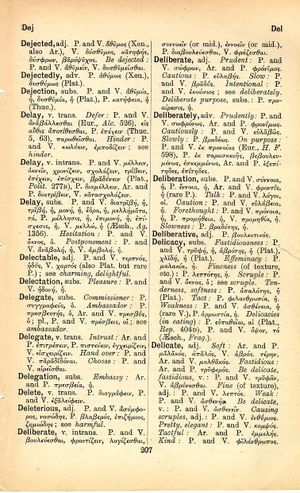dejection: Difference between revisions
From LSJ
Ὥσπερ αὐτοῦ τοῦ ἡλίου μὴ ὄντος καυστικοῦ, ἀλλ' οὔσης ζωτικῆς καὶ ζωοποιοῦ θέρμης ἐν αὐτῷ καὶ ἀπλήκτου, ὁ ἀὴρ παθητικῶς δέχεται τὸ ἀπ' αὐτοῦ ϕῶς καὶ καυστικῶς· οὕτως οὖν ἁρμονίας οὔσης ἐν αὐτοῖς τινὸς καὶ ἑτέρου εἴδους ϕωνῆς ἡμεῖς παθητικῶς ἀκούομεν → Just as although the Sun itself does not cause burning but has a heat in it that is life-giving, life-engendering, and mild, the air receives light from it by being affected and burned, so also although there is a certain harmony and a different kind of voice in them, we hear it by being affected.
(CSV3) |
m (Woodhouse1 replacement) |
||
| Line 1: | Line 1: | ||
{{Woodhouse1 | {{Woodhouse1 | ||
|Text=[[File:woodhouse_207.jpg|thumb|link={{filepath:woodhouse_207.jpg}}]] | |Text=[[File:woodhouse_207.jpg|thumb|link={{filepath:woodhouse_207.jpg}}]] | ||
===substantive=== | |||
P. and V. ἀθυμια, ἡ, [[δυσθυμία]], ἡ ( | [[prose|P.]] and [[verse|V.]] [[ἀθυμια]], ἡ, [[δυσθυμία]], ἡ ([[Plato]]), [[prose|P.]] [[κατήφεια]], ἡ ([[Thucydides|Thuc.]]). | ||
}} | }} | ||

